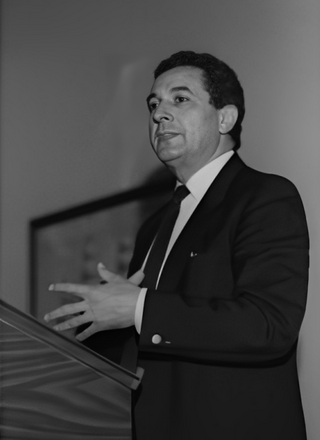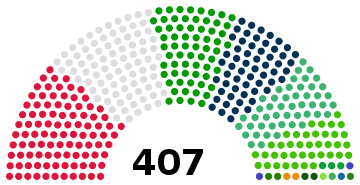
The president of the People's Democratic Republic of Algeria is the head of state and chief executive of Algeria, as well as the commander-in-chief of the Algerian People's National Armed Forces.

Abdelaziz Bouteflika was an Algerian politician and diplomat who served as the seventh president of Algeria from 1999 to his resignation in 2019.

The National Liberation Front commonly known by its French acronym FLN, is a nationalist political party in Algeria. It was the principal nationalist movement during the Algerian War and the sole legal and ruling political party of the Algerian state until other parties were legalised in 1989.
Algeria elects on the national level a head of state – the president – and a legislature. The president is elected for a five-year term by the people. People's National Assembly has 407 members, elected for a five-year term in multi-seat constituencies by proportional representation. Eight seats in the national assembly are reserved for Algerians abroad. The Council of the Nation has 144 members, 96 members elected by communal councils and 48 members appointed by the president.

Elections in Benin take place within the framework of a multi-party democracy and a presidential system. Both the President and the National Assembly are directly elected by voters, with elections organised by the Autonomous National Electoral Commission (CENA).

Elections in Botswana take place within the framework of a multi-party democracy and a parliamentary system. The National Assembly is mostly directly elected, and in turn elects the President and some of its own members. The Ntlo ya Dikgosi is a mixture of appointed, hereditary and indirectly elected members.

Elections in Gabon take place within the framework of a presidential multi-party democracy with the Gabonese Democratic Party, in power since independence, as the dominant party. The President and National Assembly are directly elected, whilst the Senate is indirectly elected.
Elections in Luxembourg are held to determine the political composition of the representative institutions of the Grand Duchy of Luxembourg. Luxembourg is a liberal representative democracy, with universal suffrage guaranteed under its constitution. Elections are held regularly, and are considered to be fair and free.

The People's National Assembly (Arabic: المجلس الشعبي الوطني, romanized: al-Majlis al-Sha'abi al-Watani; Berber languages: Asqamu Aɣerfan Aɣelnaw, abbreviated APN, is the lower house of the Algerian Parliament. It is composed of 407 members directly elected by the population. Of the 407 seats, 8 are reserved for Algerians living abroad. Members of the People's National Assembly are directly elected through proportional representation in multiple-member districts and serve terms lasting five years at a time. The last election for this body was held on 12 June 2021. The minimum age for election to the Assembly is 28.
Parliamentary elections were held in Algeria on 17 May 2007. 24 political parties and around 100 independent lists with a total of more than 12,000 candidates competed for the 389 seats in the National People's Assembly. While most Algerians voted on May 17, immigrants from Algeria to other countries and Algerians living in the Sahara and other nomads and semi-nomads voted on May 16 due to the distance from Algiers, the country's capital.
Parliamentary elections were held in Algeria on 30 May 2002 to elect members of the People's National Assembly. The governing National Liberation Front (FLN) won a majority of seats in the election. The election suffered from a low turnout, violence and boycotts by some opposition parties.

Parliamentary elections were held in Niger on 20 October 2009, after President Mamadou Tandja dissolved the National Assembly in May 2009 and a constitution referendum was held in August 2009. The elections were boycotted by most opposition parties, and saw Tandja's National Movement for the Development of Society (MNSD) win a landslide victory.

A constitutional referendum was held in Niger on 4 August 2009. The referendum proposed the dissolution of the Fifth Republic and the creation of the Sixth Republic under a fully presidential system of government, offering a yes or no vote on the suspension of the constitution and granting President Mamadou Tandja a three-year interim government, during which the constitution of the Sixth Republic would be formulated. On 20 June, the Constitutional Court declared the plan illegal, but Tandja subsequently assumed emergency powers and dissolved the Court. The events surrounding this election led to a constitutional crisis.
Parliamentary elections were held in Algeria on 10 May 2012. The incumbent coalition, consisting of the National Liberation Front (FLN) of President Abdelaziz Bouteflika and the National Rally for Democracy (RND) of Prime Minister Ahmed Ouyahia, held on to power after winning a majority of seats. The Islamist parties of the Green Algeria Alliance lost seats.

Parliamentary elections were held in Gabon in 2018 alongside municipal elections; the first round was held on 6 October and the second round on 27 October. Despite losing 15 seats, the ruling Gabonese Democratic Party maintained its two-thirds majority in the National Assembly, winning 98 of the 143 seats.

Abdelmadjid Tebboune is an Algerian politician currently serving as the President of Algeria since December 2019 and as Minister of Defence.

The 2019–2021 Algerian protests, also called Revolution of Smiles or Hirak Movement began on 16 February 2019, six days after Abdelaziz Bouteflika announced his candidacy for a fifth presidential term in a signed statement. These protests, without precedent since the Algerian Civil War, were peaceful and led the military to insist on Bouteflika's immediate resignation, which took place on 2 April 2019. By early May, a significant number of power-brokers close to the deposed administration, including the former president's younger brother Saïd, had been arrested.

The Future Front is an Algerian political party.
A constitutional referendum was held in Algeria on 1 November 2020. The subject of the referendum was a revision of the Algerian constitution, and it follows a series of protests known as Hirak.

Layachi Yaker was an Algerian diplomat and politician of the National Liberation Front.












